
SALAMANDRA
Scope & Guideline
Fostering Innovation in Herpetological Research
Introduction
Aims and Scopes
- Herpetological Diversity and Taxonomy:
SALAMANDRA publishes studies that describe new species or provide taxonomic revisions of existing taxa, emphasizing the importance of accurate species identification and classification in understanding biodiversity. - Ecological and Behavioral Studies:
Research focused on the ecological roles, behavior, and life history traits of amphibians and reptiles is a core area. This includes studies on habitat use, reproductive strategies, and interactions with other species. - Conservation Biology:
The journal addresses pressing conservation issues related to herpetofauna, including the impacts of habitat loss, climate change, and disease, emphasizing the need for effective conservation strategies. - Molecular and Phylogenetic Research:
Molecular studies that investigate genetic diversity, phylogeography, and evolutionary relationships among herpetofauna are prominently featured, providing insights into the evolutionary history and conservation genetics of these species. - Environmental and Anthropogenic Impacts:
Research examining the effects of environmental changes, pollutants, and human activities on herpetofauna is also a significant focus, highlighting the interplay between species and their changing habitats.
Trending and Emerging
- Genetic and Phylogenomic Research:
There is an increasing emphasis on molecular techniques and phylogenomic approaches to understand genetic diversity, species relationships, and evolutionary history, particularly in response to conservation needs. - Impact of Climate Change:
Research addressing the effects of climate change on herpetofauna, including studies on habitat shifts, phenological changes, and species vulnerability, is gaining traction as a critical area of focus. - Conservation Genetics and Management:
A growing number of studies are dedicated to conservation genetics, assessing genetic health, and informing management practices for endangered species, reflecting a strong commitment to practical conservation efforts. - Behavioral Ecology in Changing Environments:
Emerging research themes focus on behavioral adaptations in response to environmental changes, predator-prey interactions, and the impact of human-induced stressors on behavior, indicating a trend towards understanding ecological resilience. - Invasive Species and Their Effects:
There is a notable increase in research examining the impact of invasive species on native herpetofauna, including studies on competition, predation, and disease transmission, highlighting the need for integrated management strategies.
Declining or Waning
- Morphological Studies:
Research primarily focused on morphological characteristics without integrating ecological or genetic perspectives appears to be waning. The trend suggests a move towards more holistic approaches that combine morphology with molecular and ecological data. - Historical and Antiquity Studies:
Papers discussing historical perspectives on herpetology, such as ancient taxonomic classifications or historical distributions of species, are becoming less common. This decline may indicate a shift towards contemporary and applied research themes. - Generalized Habitat Studies:
Studies that provide broad descriptions of habitats without specific ecological or conservation implications are less prevalent. The focus seems to be moving towards more detailed, context-driven research that addresses specific ecological questions.
Similar Journals
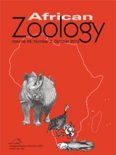
AFRICAN ZOOLOGY
Championing Conservation Through ResearchAFRICAN ZOOLOGY, published by Taylor & Francis Ltd, stands as a significant journal in the realm of Animal Science and Zoology, with a proud history dating back to 1996 and slated to continue until 2024. With an ISSN of 1562-7020 and E-ISSN 2224-073X, this journal provides a reputable platform for researchers and practitioners dedicated to the study of animal biology across the African continent. It has been recognized for its quality scholarship, evidenced by its Q3 categorization in the 2023 Scopus quartile rankings and an impressive rank of #182 out of 490 within its field. As an open-access journal, it facilitates the dissemination of vital research findings and promotes broader accessibility, catering to a diverse audience of professionals, scholars, and students alike. The journal aims to enhance our understanding of wildlife, conservation, and ecosystem dynamics in Africa, fostering collaborations that address critical ecological challenges. For researchers and enthusiasts keen on contributing to and staying informed about advancements in zoological science, AFRICAN ZOOLOGY is an essential resource that enriches the global discourse on biodiversity and conservation efforts.
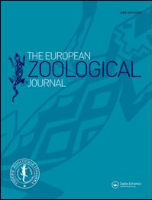
European Zoological Journal
Championing Open Access to Zoological KnowledgeEuropean Zoological Journal, published by Taylor & Francis Ltd, is an esteemed open-access publication dedicated to advancing the exciting field of zoology. Since its inception in 2017, this journal has progressively established itself as a vital resource for researchers, professionals, and students alike. With its Q2 ranking in Animal Science and Zoology as of 2023, the journal ranks in the 69th percentile among its peers, showcasing its influence and contribution to the discipline. The journal’s broad scope covers a wide range of topics within zoology, aiming to foster an understanding of animal biology and conservation efforts. As an open-access journal, it not only enhances the dissemination of knowledge but also encourages collaborative research across global communities. Situated in the United Kingdom, the European Zoological Journal invites submissions that contribute to the evolving discourse in animal sciences, and endeavors to support the scientific community in addressing pressing ecological challenges.

ANNALES ZOOLOGICI FENNICI
Exploring Biodiversity Through Scientific InquiryANNALES ZOOLOGICI FENNICI, published by the Finnish Zoological Botanical Publishing Board, is a prominent scientific journal dedicated to advancing the fields of Animal Science, Zoology, Ecology, Evolution, Behavior, and Systematics. Based in Finland and serving an international audience, this journal has been an essential resource since its inception in 1974, offering valuable insights into biodiversity, conservation, and ecological dynamics. While it holds a respectable Q3 quartile ranking across several relevant categories in 2023, its impactful contributions to the scientific community continue to promote critical discussions and foster research collaborations. Although the journal is not currently open access, its robust indexing in Scopus and recognition within the academic community underscore its significance. As a researcher, professional, or student, engaging with the ANNALES ZOOLOGICI FENNICI not only enriches your knowledge but also aligns you with the forefront of zoological research and conservation studies.
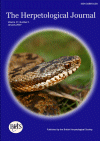
HERPETOLOGICAL JOURNAL
Unveiling the secrets of herpetology through rigorous research.Herpetological Journal, published by the British Herpetological Society, is a prominent platform dedicated to publishing high-quality research in the fields of herpetology, ecology, and conservation. With its ISSN 0268-0130, this journal has established a significant presence in the academic community, especially as it continues its publication journey from 1987 to 2024. Notably, the journal boasts a commendable impact factor, being ranked in the second quartile (Q2) for Animal Science and Zoology, and holds a third quartile (Q3) ranking in other essential categories including Ecological Modeling and Ecology, Evolution, Behavior and Systematics. The Herpetological Journal serves as an indispensable resource for researchers, professionals, and students, fostering the exchange of innovative ideas and insights crucial to the understanding of reptiles and amphibians. Although the journal currently does not offer open access, it remains a vital choice for those invested in the ongoing dialogue around herpetological studies and nature conservation.
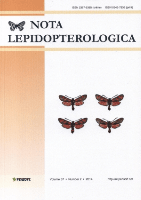
NOTA LEPIDOPTEROLOGICA
Fostering global collaboration in biodiversity research.NOTA LEPIDOPTEROLOGICA, an esteemed journal published by Pensoft Publishers, has been a cornerstone in the fields of Insect Science, Animal Science, Ecology, and Evolution since its inception in 1995, with a commitment to open access publication since 2014. Based in Sofia, Bulgaria, this journal serves as a vital platform for researchers and professionals alike, facilitating the dissemination of significant findings related to Lepidoptera and broader ecological interactions. With an impressive scope covering vital aspects of biodiversity and taxonomy, NOTA LEPIDOPTEROLOGICA holds a Q3 ranking in its categories according to the 2023 metrics and plays a crucial role in advancing our understanding of insect science. By fostering international collaboration among scholars, the journal not only emphasizes the ecological importance of Lepidoptera but also contributes to global conservation efforts, making it an indispensable resource for students and experienced researchers aiming to deepen their knowledge in these fields.
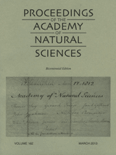
PROCEEDINGS OF THE ACADEMY OF NATURAL SCIENCES OF PHILADELPHIA
Advancing ecological knowledge for a sustainable future.PROCEEDINGS OF THE ACADEMY OF NATURAL SCIENCES OF PHILADELPHIA, published by the Academy of Natural Sciences of Philadelphia, is a prominent journal in the field of ecological sciences, offering a platform for groundbreaking research and discoveries that enhance our understanding of natural systems. With an ISSN of 0097-3157, this journal contributes rich insights into various ecological disciplines, from behavioral studies to systematics, as evidenced by its Scopus rankings and Q4 quartile placements in Ecology and Ecology, Evolution, Behavior and Systematics. The journal is committed to fostering a collaborative academic environment and aims to disseminate high-quality research that influences environmental policies and conservation strategies. Although it does not primarily operate under an open-access model, it serves as an essential resource for researchers, professionals, and students keen on advancing their knowledge in ecological research and natural history.

NOVITATES CARIBAEA
Celebrating the Diversity of Caribbean Life and LandscapesNOVITATES CARIBAEA is a distinguished academic journal dedicated to the exploration of Caribbean natural history, fostering a deep understanding of the region's biodiversity and ecological significance. Published by the MUSEO NACIONAL HISTORIA NATURAL-SANTO DOMINGO, this open-access journal has been a platform for scholarly communication since 2009, aiming to provide unrestricted access to high-quality research outputs. With its commitment to promoting research in Caribbean ecosystems, NOVITATES CARIBAEA plays a crucial role in the academic community, facilitating knowledge exchange among researchers, professionals, and students. The journal welcomes submissions exploring various aspects of natural history, including taxonomy, conservation biology, and ecological studies, making it an essential resource for those dedicated to understanding and preserving the unique environments of the Caribbean.
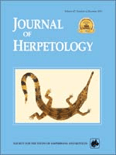
JOURNAL OF HERPETOLOGY
Fostering Knowledge in the World of HerpetofaunaJOURNAL OF HERPETOLOGY, published by the SOCIAL STUDY AMPHIBIANS REPTILES, is a premier platform dedicated to the advancement of knowledge in the field of herpetology, encompassing the study of amphibians and reptiles. With a dedicated ISSN of 0022-1511 and E-ISSN 1937-2418, this esteemed journal has been enriching the scientific community since its inception, with contributions spanning from 1980 to 1983 and from 1985 to 2024. As a notable entry in the Q3 category for both Animal Science and Zoology, as well as Ecology, Evolution, Behavior and Systematics in 2023, it maintains a competitive presence with a Scopus rank in the 40th and 33rd percentiles within its respective fields. Although it does not currently offer Open Access, the journal aims to foster a deeper understanding of the ecological and evolutionary dynamics of herpetofauna, making it an essential resource for researchers, professionals, and students alike. Whether you are exploring conservation strategies or evolutionary patterns, JOURNAL OF HERPETOLOGY remains a vital contributor to ongoing discussions and discoveries in the scientific exploration of reptiles and amphibians.

AMPHIBIA-REPTILIA
Championing Peer-Reviewed Research for Ecological ProgressAMPHIBIA-REPTILIA, published by BRILL, stands as a prominent journal in the field of zoology and ecology, specializing in herpetology, the study of amphibians and reptiles. With a rich history since its inception in 1980, this journal aims to disseminate high-quality, peer-reviewed research that advances our understanding of these vital vertebrate groups. Holding a commendable 2023 Q2 ranking in both Animal Science and Zoology and Ecology, Evolution, Behavior and Systematics, it is recognized for its contributions to the scientific community. Researchers are encouraged to submit their manuscripts, benefiting from the journal's commitment to academic excellence, which is showcased in its operational transparency and rigorous editorial process. Though currently not open access, the journal's findings are pivotal for advancing conservation efforts and ecological studies, making it an essential resource for scholars, professionals, and students invested in these important fields.

Acta Herpetologica
Connecting Researchers in the Realm of HerpetologyActa Herpetologica, published by FIRENZE UNIV PRESS, is a reputable Open Access journal dedicated to the field of herpetology, encompassing research on amphibians and reptiles. Established with the aim to foster scientific discourse, this journal has made its content freely accessible since 2006, enabling researchers, professionals, and students to engage with a diverse array of studies and findings. As of 2023, the journal is categorized in Q3 of Animal Science and Zoology and ranks 357 out of 490 in the Scopus database, reflecting its contribution to the field and providing a platform for high-quality research. The journal showcases manuscripts that cover a wide range of topics, from ecology and conservation to physiology and evolution, supporting global efforts to understand and preserve herpetofauna. With a convergence period spanning from 2009 to 2024, Acta Herpetologica continues to be an essential resource for advancing academic knowledge and facilitating discussions in herpetological research.